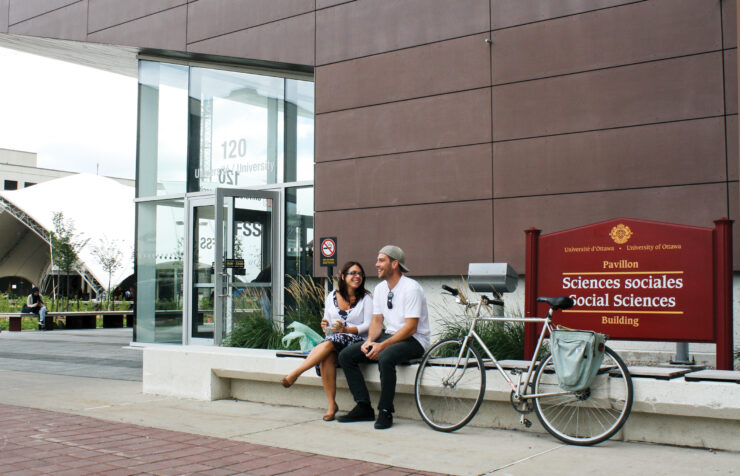Indigenous rights protestors occupied TransCanada Gas offices, held ceremony
On Jan.15, a group of anti-pipeline protestors carried out a series of demonstrations in downtown Ottawa.
Wet’suwet’en protestors in BC gained international attention after an RCMP raid on a camp that was blocking the construction of the Coastal Gaslink pipeline. This protest was one in a series of solidarity demonstrations nationwide.
The event began at 1 p.m. with a rally in Confederation Park, where the protestors provided donated food for free to all attendees and passersby.
“We are here to cause real change and support everyone that the government has let slip through the cracks,” Jordan Reiss, a third-year political science student at the University of Ottawa told the Fulcrum. “Sharing food with your neighbours —it’s a really powerful way to show everyone you are on their side.”
At 2 p.m., the protestors marched to 275 Slater St.—an office building home to a small TransCanada Gas office.
The protestors went to the ninth floor of the building despite accusations of trespassing by the building’s staff. Ottawa Police Service officers attempted to block and disable elevators but were ultimately ignored by the protest group, furthering tension with the officers and the building’s private security. Indigenous protest groups carried out a traditional peace pipe ceremony while in the office. Protestors later demanded that office workers call their Calgary headquarters to ask for an end to all projects on Wet’suwet’en territory.
“The core issue here is respect. Respect for the First Nations of Turtle Island, and respect for Canadian citizens who have to deal with the fallout of the oil industry’s mess,” Marie, a self-described water warrior, shared.
The Canadian government maintains that they have consulted all First Nations band councils which hold territory in the planned path of the Coastal Gaslink pipeline. However, some Indigenous populations claim that the band councils do not represent their constituents. Instead, they recognize the authority of the hereditary chiefs of the Wet’suwet’en, who have not been formally consulted.
“When Trudeau talks about consultation—well that’s not consent. It’s like breaking into your house, but the robber asks if he can take the TV too, or just your jewelry,” added Lewis, a carpenter and Marie’s partner.
The elected band council system was imposed by the Indian Act and is not a traditional form of First Nations governance.
Not all protestors at Tuesday’s event were there to support the hereditary council. Environmentalist groups—including Earth Strike and Extinction Rebellion—also showed up to the demonstration.
“We are talking about investing billions of dollars in fossil fuels when the (Intergovernmental Panel on Climate Change) has told us we have 12 years to save ourselves (from global warming),” said Glenn, an agricultural worker and EarthStrike protestor. “We can spend 6 billion dollars on a pipeline to carry gas that might kill us in a decade, or we can spend it on green energy that will serve us for generations.”
The Coastal Gaslink pipeline is currently on hold pending federal review by the National Energy Board. Protestors have committed to continuing demonstrations until the federal government cancels all pipelines on Wet’suwet’en territory and recognize the authority of the hereditary council.





